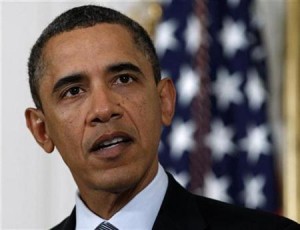 The White House stepped up its campaign for a peaceful transition and an end to the violence in Egypt Thursday as President Barack Obama called for greater respect for the “rights and aspirations of the Egyptian people.”
The White House stepped up its campaign for a peaceful transition and an end to the violence in Egypt Thursday as President Barack Obama called for greater respect for the “rights and aspirations of the Egyptian people.”
We pray “that a better day will dawn over Egypt,” Obama said at the National Prayer Breakfast in Washington.
White House Press Secretary Robert Gibbs told reporters “it is important that we all begin to see meaningful steps, and that negotiations take place between the (Mubarak) government and a broadly based group of members of the opposition as we work through the transition toward free and fair elections.”
Egyptian President Hosni Mubarak has announced he will not seek re-election in September. Protesters, however, continue demand that Mubarak step down immediately with a caretaker unity government running the country until the fall elections.
Gibbs also reiterated the administration’s condemnation of the violence that erupted in Cairo Wednesday. At least five people were killed and 836 injured, according to the Egyptian health ministry.
Newly appointed Egyptian Prime Minister Ahmed Shafiq has apologized for the attacks, which many believe was the work of pro-government thugs. Vice President Omar Suleiman has promised the perpetrators of the violence would be held accountable.
Also of concern to the U.S. administration: a spate of attacks against journalists in Egypt. Members of the media attempting to cover the unrest are reporting being targeted, beaten, arrested and harassed by security forces and police.
State Department officials told CNN Thursday they have information that the Egyptian Interior Ministry is involved in a roundup of journalists. The officials said they are hearing reports from the U.S. Embassy in Egypt that the ministry has been involved in the arrest of reporters.
Senior State Department officials are expected to discuss the issue with the Egyptian Embassy in Washington and the Foreign Ministry in Cairo.
Secretary of State Hillary Clinton is expected to issue a statement Thursday afternoon about the violence against journalists.
“There is a concerted campaign to intimidate international journalists in Cairo and interfere with their reporting. We condemn such actions,” State Department spokesman P.J. Crowley said.
The United States continues to walk a fine diplomatic line in the crisis, encouraging President Hosni Mubarak to transition from power while stopping short of publicly asking him to step down.
Officials say the restraint is needed because the White House is mindful that allies in the Middle East are concerned about American loyalty. Government contacts have expressed reservations about how vocal the Obama administration has been in pressing Mubarak, a close American ally of three decades.
Other regional allies are concerned about how quickly the United States might turn on them if protests start in their countries, the State Department officials said.
The White House, meanwhile, has made a deliberate decision to let Adm. Mike Mullen, chairman of the Joint Chiefs of Staff, take the lead role in communicating with the Egyptian military about its role in the current unrest, according to two senior U.S. officials.
Mullen has not told Egyptian military leaders to pressure Mubarak to step down, the officials insisted to CNN. “That’s not his role,” one official said.
Mullen is, however, trying to push the Egyptian military to maintain security, not move against peaceful protestors, and keep the violence from escalating.
The U.S. government believes Mubarak will not issue a direct order to the Egyptian army to do anything because he is uncertain his orders would be followed, one official with very direct knowledge of evolving U.S. policy in the crisis told CNN.
A refusal on the part of the army to obey Mubarak would spell the end of the Egyptian leader’s rule, the official noted. At that point, Mubarak would have to leave the country.
The U.S. belief right now, the official said, is that Suleiman is letting the army feel it is “representing the flag of the nation” in trying to help without making a massive move against the government.
As U.S. diplomatic officials try to navigate the quickly evolving crisis, the State Department is urging Americans who want help in getting out of Egypt to take advantage of U.S. government charter flights while they are available.
A senior State Department official, speaking on background because he was not authorized to use his name, told CNN that while “we cannot demand that an American leave … we certainly (will) push for them to leave.”
According to that official, the State Department began cutting back on the number of flights Thursday because some of those flights have been leaving with empty seats.
About 3,000 Americans have registered for evacuation so far. An estimated 2,000 have been flown out on U.S. government charters to European locations.
Since Monday, the State Department has been running four flights a day, on average, and has been urging American citizens who want to leave to come to the Cairo airport as soon as possible.
Commercial flights from Cairo are operating, and a number of Americans have also left via commercial airlines, private airlines, and other governments’ chartered flights, according to the State Department.
U.S. officials are assessing whether flights will continue Friday and into the weekend.

Leave a Reply
You must be logged in to post a comment.